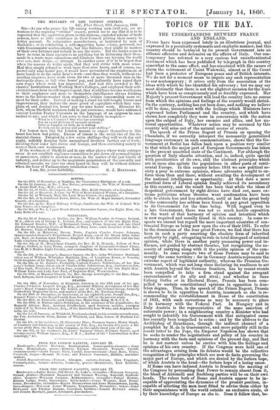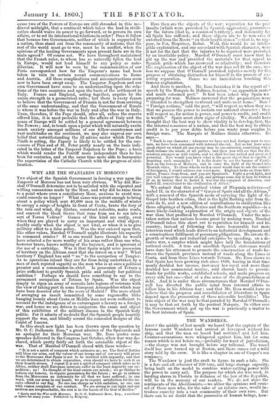TOPICS OF THE DAY.
THE UNDERSTANDING BETWEEN FRANCE AND ENGLAND.
FEARS have been expressed lately in an illustrious journal, and expressed in a peculiarly systematic and emphatic manner, lest this country should be betrayed by its present Government into an alliance offensive and defensive on the affairs of Italy. Our con- temporary has referred to a very curious but unauthenticated statement which has been published by telegraph in this country somewhat to the same effect, and has associated with the causes of alarm the retirement of Count Walewski, almost as if the Count had been a protector of European peace and of British interests. We do not for a moment mean to impute any such representation to our contemporary ; it arises only from the association of the ideas with which he has identified his advocacy; but we may say most distinctly that there is not the slightest occasion for the fears which have been so conspicuously and so forcibly expressed. Her Majesty's present Government will lead the country into no course from which the opinions and feelings of the country would shrink. On the contrary, nothing has yet been done, and nothing we believe will be done, inconsistent with the feelings which Ministers have expressed before Parliament and the country, and which have shown how completely they were in concurrence with the nation upon the subject of Italy, her enemies and allies, and her na- tional opportunities. Whatever action may be assumed by this country will arise out of the natural course of events.
The speech of the Prince Regent of Prussia on opening the Chambers, if we correctly interpret the necessarily generalized language customary in such communications, shows that the Go- vernment at Berlin has fallen back upon a position very similar to that which the major part of European Governments has taken in the present unsettled state of the Continent. For although the question of Italy absorbs attention, and is indeed, quite special
with peculiarities of its own, still the abstract principles which are in issue also agitate the populations in other parts of conti- nental Europe. In this country before 1831 we saw political so- ciety a prey to extreme opinions, whose advocates sought to en- force them then and there, without awaiting the development of the national intelligence or opportunity. At that date a more practical form of Liberal opinion finally achieved its ascendancy in this country, and. the result has been that while the ideas of despotical government by right divine have died out, more ex- treme politicians whose theories want confirmation have been
able to obtain less and less attention, until at last the great body of the community has seldom been found in any great opposition to its Government for the time being. With regard even to a late Government, there was not so much hostile opposition as the want of that harmony of opinion and intention which is now required and usually found in this country. In some re- spects we cannot but regard the most important countries of con- tinental Europe as being now upon the eve of their 1831. To refer to the dominions of the four great Powers, we find that there has been in each a party asserting the obsolete form of inherited authority by right, arrogating to rule in total disregard of national opinion, while there is another party possessing power and in- fluence, not guided by abstract theories, but recognizing the ne- cessity of carrying along with it the public opinion of the com- munity. In some respects two of those Powers may be said to occupy the same territory; for in Germany Austria represents the extreme aspect of legitimist authority, whereas the Prussian Go- vernment, which was not long since declaring its readiness to act with Austria beyond the German frontiers, has by recent events been compelled to take a firm stand against the arrogant encroachments of its ally and rival ; and whether in Saxe Coburg Gotha or in Electoral Hesse, Prussia has been com- pelled to sustain constitutional opinions in opposition to Aus- trian dogma. Thus, in the speech of the Prince Regent, Prussia is shown to be in opposition to Austria inasmuch as she is re- commending the reestablishment in Hesse of the constitution
of 1831, with such corrections as may be necessary to place it in harmonywith the Federal Pact, In Hungary and in i Italy Austria s the representative of the same assertion of autocratic power ; in a neighbouring country a Minister who had sought to indentify his Government with that antiquated cause has recently been compelled to retire ; and by the address to the Archbishop of Bourdeaux, through the indirect channel of a pamphlet by M. de la Gueronniere, and more palpably still in the recent letter to the Pope, the Emperor Napoleon has shown that he seeks to render the negotiations and policy of his country in harmony with the facts and opinions of the present day, and that he is not content unless he carries with him the feelings and opinions of his own country. If the Congress were held one of the advantages arising from its debates would be the collective recognition of the principles which are now de facto governing the major part of Europe, and which are denied by the forlorn hope, of which Austria is the head—the forlorn hope of a losing cause. If Rome can have induced Austria to frustrate the meeting of the Congress by persuading that Power to remain absent from it, the blood of Antonelli and Rechberg parties will be on their own heads. The rulers both of Rome and Austria appear to be in- capable of appreciating the dynamics of the present position, in- capable of selecting the men most fitted to advise them either by their acquaintance with the world outside an exclusive circle' or by their knowledge of Europe as she is. Does it follow that, be- cause two of the Powers of Europe are still shrouded in this me- direval midnight, that a continent which takes the lead in civili- zation should waive its power to go forward, or to govern its own affairs, or to set its international relations in order? Does it follow that because two Governments, neither of which is supported by a nation, thus stand out from the community of nations, that the rest of the world must go to war, must be in conflict, when the opinions of the leading Governments upon present facts are in the main agreed? Of course not. We have throughout maintained that the French ruler, to whom has so naturally fallen the lead in Europe, would not lend himself to any policy so ante- diluvian. It will now be seen by the communication of our Paris correspondent how far the Emperor's name had been taken in vain in certain recent communications to Rome and Austria. All these complications and misconstructions seem now to have been swept away. The Emperor. Napoleon and our own Government have come to an understanding upon the rela- tions of the two countries and upon the basis of the settlement in Italy. France and England, acting together, acquire by the union strength in a geometrical ratio ; but there is every reason to believe that the Government of Prussia is not far from arriving at the same understanding, and that the Government of Russia is where it was before the war in Italy and after the war in Italy. Even, therefore, if the Pope should, after all, refuse the reserve offered him, it is most probable that the affairs of Italy and the peace of Europe will be settled by a general agreement between the Powers ; and, to touch upon a point which will naturally excite much anxiety amongst millions of our fellow-countrymen and vast multitudes on the continent, we may also express our own belief that notwithstanding the ill advice under which Pius the Ninth is acting, the Papacy is likely to be settled for the suc- cessors of Pius and of St. Peter pretty nearly on the basis indi- cated in the letter of the Emperor Napoleon to the Pope ; a basis which would render the Pontiff more independent than he has been for centuries, and at the same time more able to harmonize the supervision of the Catholic Church with the progress of civi- lization.



























 Previous page
Previous page